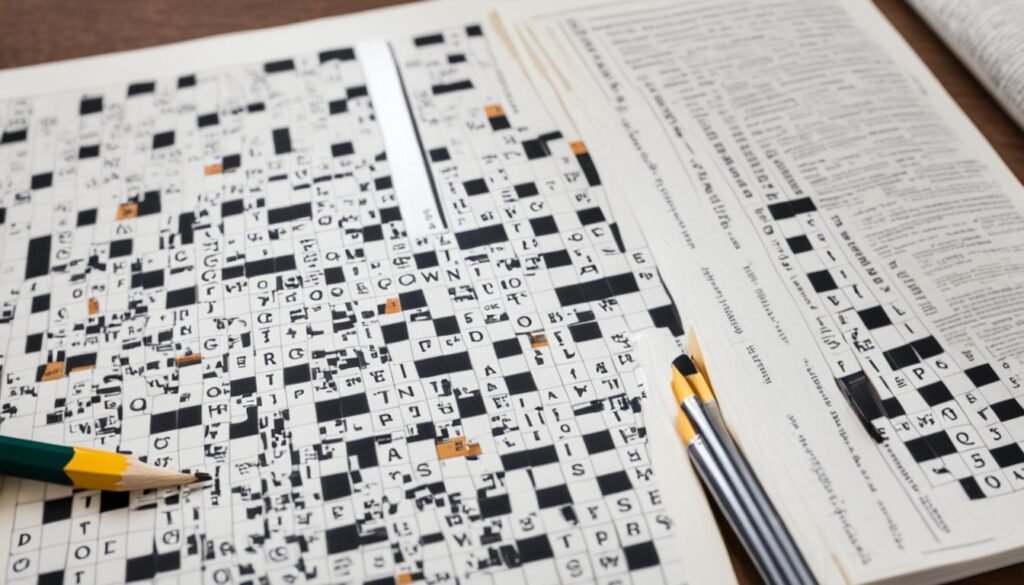Crossword puzzles are more than a word game. They’re a fun way to test your brain. You can learn new words and improve your problem-solving skills. Are you new to crosswords or already good at them? Here are tips to help you get better.
Key Takeaways:
- Start with Monday puzzles. They’re designed to be easy, perfect for new solvers.
- Friday and Saturday puzzles are the most challenging. They will test you.
- Thursday puzzles have a theme that makes them harder.
- Learn about “crosswordese.” These are short, common words in crossword puzzles.
- It’s okay to look up information online. This may help you solve tricky clues.
These tips will make you better at solving crosswords. Tackling hard puzzles will seem easier. Get a pencil and enjoy improving your skills with fun and rewarding puzzles.
Why the Saturday NYT Puzzle?
The Saturday NYT puzzle is a favorite for those who love crosswords. It’s the hardest puzzle each week, designed for the best solvers out there. But what makes it worth trying?
1. The ultimate test: It’s said to be the toughest of all NYT puzzles. Created by Kelly Morenus, it’s her first for the paper. The puzzle aims to give your brain a real workout.
2. A smooth solving experience: Even though it’s tough, solving it feels smooth and enjoyable. The clue pick feels perfect, not too easy and not too hard. So, finishing sections leaves you feeling great.
3. Engaging and creative clues: The clues are full of fun, words, and clever hints. For example, you might find a clue about a 1998 hit or a punny clue. They make solving entertaining and help you learn new words.
4. Breaking the conventional belief: Many think the Sunday puzzle is the hardest, but it’s not true. Solving the Saturday NYT puzzle is a big achievement. It shows you can handle any puzzle challenge.
If you enjoy a hard crossword, the Saturday NYT puzzle is for you. It tests your brain and lets you feel the joy of finishing a tough puzzle. So, tackle it and see your skill and satisfaction grow.
Defining Success in Crossword Solving
Success in crossword solving comes when you finish a puzzle in one go without help. This often means tackling the Saturday NYT puzzle. It’s known to be super tough and a challenge to the best solvers.
Completing the Saturday NYT puzzle on your own shows you’re really good. It proves you can handle grave challenges and become better at solving crosswords.
Crossword success is a personal win. It feels great to overcome a big puzzle by yourself. It shows you’re smart, persistent, and have a good vocabulary.
Normally, finishing a Saturday puzzle takes between 20 to 30 minutes. But, the real win isn’t just about the time it takes. It’s about getting better and tackling even harder puzzles.
Solving a crossword without help says a lot. It shows you’re sharp, focused, and quick on your feet. It’s all about spotting patterns and linking clues together.
Remember, winning at crosswords is a journey. Set doable goals, cheer your small wins, and enjoy the puzzle-solving process. With effort, you’ll tackle any puzzle and feel the joy of cracking it.
Starting Point and Baseline
My crossword puzzle journey began in college, tackling New York Times (NYT) puzzles on Mondays. These puzzles were perfect for starting. They helped me learn the basics of solving crosswords.
I started with the Monday puzzles. They are simpler and great for beginners. This approach introduced me to common crossword clues and formats.
Focusing only on Mondays isn’t enough for the Saturday NYT puzzle. The Saturday puzzle is very hard. It’s known as the most difficult and is a significant challenge each week.
To tackle harder puzzles, like the Saturday NYT, you need to work up. Start with the easy ones on Monday. Then, slowly go through the rest of the week. This method helps you learn as you go, getting better day by day.
Use your experience with Monday puzzles as a starting point. Then up the challenge by hitting harder puzzles every day of the week. The ultimate goal is to beat the Saturday NYT puzzle. It will test your crossword skills to the limit.
Crosswords are more than just games. They help your mind stay sharp. They boost your vocabulary, problem-solving, and thinking skills. So, dive into the world of crosswords, with the New York Times as your companion.
Tips for Solving Crossword Puzzles
Want to boost your skill in crosswords? Try these tips for tackling tough puzzles:
- 1. Start with a pencil: Using a pencil lets you fix mistakes easily. It’s much handier than a pen.
- 2. Begin with Monday puzzles: New to crosswords? Start with Monday ones. They’re made for beginners.
- 3. Pay attention to clue format and phrasing: Clues give hints, so look at their structure and wording. This helps find hidden clues.
- 4. Work with word intersections: In hard puzzles, look at where words cross. Solving one right word can unlock others.
- 5. Utilize your own knowledge and expertise: Use what you know. Your own skills and knowledge are powerful tools.
- 6. Be mindful of question mark clues: Clues with question marks are tricky. They often have more than one answer.
- 7. Don’t hesitate to use Google: Can’t solve a clue? It’s okay to Google it. You might find the answer quickly.
Stick to these tips to master crosswords. Keep practicing with new puzzles. Enjoy the challenge!
| Statistic | Insight |
|---|---|
| Starting with FITB clues helps get the puzzle going. | It allows you to fill in letters fast, keeping you moving. |
| Short words like 3, 4, and 5 letters pop up a lot. They are used often in crosswords. | Knowing this can make solving puzzles easier. Focus on these lengths. |
| Crosswordese are words mostly used in puzzles, not in regular talk. | Knowing crosswordese gives you an edge. You’ll spot these common words easily. |
| Guessing answers lightly with a pencil can help check other answers, especially with specific clues. | It lets you check how well other clues fit. This helps remove wrong answers. |
| Today, more clues have multiple-word answers. | Don’t just limit yourself to one-word answers. Think about more than one word if the clue suggests it. |
| Taking a break and coming back to a puzzle can spark a sudden solution. | Stumped on a clue? A pause can offer a new view, helping you solve it better later. |
| Looking up answers in references can help when you’re really stuck. | If you’ve tried everything, looking up can sometimes reveal the missing answer. |
Building Crossword Vocabulary
In crossword puzzles, knowing many words well is crucial. It helps you understand the hard and unusual words in clues. It lets you handle names with ease, which can be tough for others. Here are ways to expand your crossword vocabulary:
- Engage in Regular Reading: Reading a lot exposes you to many new words. It shows you different writing styles, genres, and topics. This means you find new words and strengthen the ones you do know.
- Subscribe to Word-of-the-Day Services: Signing up for a word-of-the-day email gives you a new word each day. You get to learn the word’s meaning, how to say it, and how to use it. This can really build your vocabulary.
- Utilize Online Resources: Many websites have lists of words common in crosswords. They’re great for picking up new crossword words to add to your arsenal.
- Familiarize Yourself with Proper Nouns: Remember, proper nouns like names are common in crossword puzzles. Staying in the know about different subjects and major names can make tackling them easier.
Using these tips can make you better at solving crosswords. You’ll feel more sure when facing any puzzle.

Utilizing Crossword Solving Tools
Facing tough clues or needing to check answers, crossword tools come in handy. They help you find words by entering what you know. But remember, it’s best to use them smartly. Over-relying can hurt your puzzle skills and fun.
Online crossword dictionaries are like treasure chests of word clues and meanings. They help you understand direct and tricky clues. By using them to think in new ways, finding right answers gets easier.
Crossword solvers work by guessing words based on clues you have. They’re great for unsticking on a hard clue or checking if an answer might be right. Yet, don’t let them take over completely. Part of the joy in solving puzzles is doing it yourself.
Into solving on your phone or tablet? Crossword apps are your perfect match. They come with hints and tips, plus a letter reveal feature. Great for playing whenever you can, even in tiny moments.
Right use of these tools can boost your puzzle-solving skills. They’re a big help with tough parts, but use with care. There’s a lot of pride in figuring clues out on your own.
Practice Makes Perfect
Mastering crossword puzzles is like any other skill; it takes practice. Start with easier puzzles. Then, slowly increase the difficulty over time.
Begin with puzzles made for beginners. This will help you build confidence and learn key skills. Getting used to puzzle styles makes challenging ones easier later on.
As you get better, try your hand at the New York Times crosswords. These are tough but great for sharpening your skills further.
Joining online communities is also a good idea. Here, you can get tips from experienced solvers. This helps you learn new strategies and build on your skills.
Remember, regular practice makes a big difference. It improves how you solve puzzles, grows your vocabulary, and sharpens your thinking. So, keep at it, enjoy the journey, and you’ll get better with every crossword.
| Benefits of Practice | Online Communities and Forums |
|---|---|
|
|
Practice regularly, engage with online communities, and watch as your crossword-solving skills flourish!
Brian’s Tip:
Don’t panic if you get stuck on a clue. Take your time and feel free to look up new words. Every puzzle solved helps you become a better solver.
Understanding the Clues
Solving crossword puzzles starts with understanding the clues. Clue difficulty varies. It ranges from simple definitions to tricky wordplay. Reading clues carefully and thinking about what they might mean is key. Start with the easy clues to build your solving skills for tougher ones.
It’s key to focus on how clues are written when you solve crosswords. Some are clear, but others need you to think in new ways. They might have more than one possible meaning.
Wordplay is used a lot in crossword puzzles. Clues often use anagrams, homophones, or hidden words. These kinds of hints need more creative thinking to solve.
“Learning to interpret crossword clues is like unraveling a cleverly crafted riddle. It’s all part of the puzzle-solving experience and adds to the sense of accomplishment once you crack the code.”
Look out for clues with question marks or exclamation points. They usually hide a pun or a play on words. These clues ask you to think beyond the obvious.
The New York Times Crossword is known for tricky clues. Some can be understood in different ways. This makes solving them more fun and challenging. Be willing to consider various answers and enjoy the puzzle’s creativity.
Keep solving puzzles to get better at understanding the clues. Over time, patterns and tactics of crossword makers will become familiar to you.
| Clue Attribute | Proportion |
|---|---|
| Attention to tense | 100% |
| Differentiation between singular and plural forms | 100% |
| Multiple meanings or parts of speech | 100% |
| Question mark clues indicating wordplay or puns | 100% |
| Clues ending in “say” for broader category answers | 100% |
Getting good at interpreting clues makes solving crosswords enjoyable. With enough practice, even hard puzzles will become fun challenges.
Tips for Enjoying Crossword Puzzles
Crossword puzzles can be hard sometimes. But they’re also fun. You should feel good when you solve them. It’s not just about the challenge. So, take it easy, step away when it’s too much, and enjoy the journey.
Finding the right balance between fun and challenge is key. Here are some hints to make solving crosswords better:
- Start with the right level of difficulty: Begin with Monday puzzles if you’re new. They’re the easiest. Then, work your way up through the week. This way, you’ll learn and still have fun.
- Take your time and relax: Read clues well and think before answering. Don’t hurry. It’s a chance to have fun and exercise your brain in a different way.
- Break it into manageable chunks: If a clue stumps you, take a break. Stepping away can offer fresh insights. Segment the puzzle and solve it piece by piece.
- Find motivation and inspiration: Learn from pros like Megan Amram. Their stories can fuel your passion to continue, no matter the challenge.
- Share the experience: Solving puzzles with others is fun. Use the New York Times’ social features to team up with friends from afar. Enjoy the process together.
- Celebrate your successes: Finishing any puzzle, easy or hard, is an achievement. Give yourself credit for working out those clues. Remember, it’s about fun and learning, not a test of your smarts.
With these hints, solving crosswords will be better. They mix fun, brain exercise, and feeling good after solving one. So, pick up your pencil and dive into the crossword world!
Conclusion
Mastering crossword puzzles is rewarding and takes skill, strategy, and practice. By using the tips in this article, you’ll improve your puzzle-solving skills. This will let you face tough puzzles with assurance.
To do well in crossword puzzles, a good vocabulary is key. Read often and learn new words each day. Use websites and apps that offer lists of words commonly found in crosswords.
Understanding clues is crucial too. Focus on how clues are phrased and think about different meanings. Start with easy puzzles and move to harder ones. This helps you build up your solving skills.
Most importantly, have fun with crossword puzzles. They should bring joy and a sense of accomplishment. Enjoy the challenge and take your time. If you need to, take a break or ask for a hint. With effort, anyone can get good at solving crossword puzzles.
FAQ
What is a crossword puzzle?
A crossword puzzle is a fun word game. It makes you think and tests how well you know words. You have a grid with squares and you use clues to fill the squares with the right letters.
How do crossword puzzles work?
You get clues to find specific words to fit into the grid. The words you find need to fit with the others. By figuring out the hints and putting in the words, you finish the puzzle.
Are crossword puzzles difficult?
Yes, sometimes crossword puzzles are tough. They can get harder over time. But, if you practice and use good strategies, you can get better at them.
How can I improve my crossword-solving skills?
To get better at crosswords, start with easier ones. Then, move on to harder puzzles. Remember to pay attention to clues and the way they are worded. Feel free to search online for help if you get stuck. Also, reading more and doing puzzles often will boost your skills.
What is the most challenging crossword puzzle?
The hardest puzzle each week is the Saturday New York Times puzzle. It’s tough even for skilled players. But, taking on this challenge can make you better at solving all crossword puzzles.
How can I expand my crossword vocabulary?
To get a bigger crossword vocabulary, read a lot. Sign up for word services that introduce new words daily. Use online tools that list common crossword words. Also, learn about famous people and places. They show up a lot in puzzles.
Are there tools to help solve crossword puzzles?
Yes, there are tools like online dictionaries and apps to assist with puzzles. But, don’t use them too much. The fun of solving crosswords is in the challenge. Using these tools a lot might take away from that.
How can I enjoy solving crossword puzzles?
Finding fun in crossword puzzles means accepting the challenge. Use the puzzle to test and expand your skills. It’s okay to take breaks. And always focus on the joy of solving each puzzle, no matter its difficulty.
What are some tips for understanding crossword clues?
Clues can be simple or tricky. It’s important to read them carefully. Start with the easy ones to get going. Look out for special clues like those with question marks or exclamation points. They might have a twist to them.
What is the best way to practice crossword puzzles?
The best way to get better at crosswords is to keep doing them. Begin with simple puzzles and move up to harder ones. This helps you learn new strategies. Staying in touch with other crossword fans online can also offer great advice and conversation.








